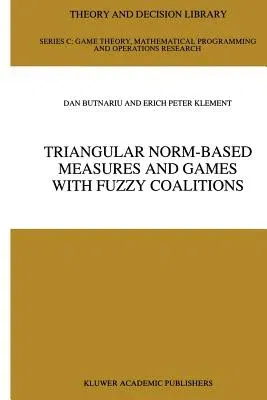This book aims to present, in a unified approach, a series of
mathematical results con- cerning triangular norm-based measures and a
class of cooperative games with Juzzy coalitions. Our approach intends
to emphasize that triangular norm-based measures are powerful tools in
exploring the coalitional behaviour in 'such games. They not and
simplify some technical aspects of the already classical axiomatic the-
only unify ory of Aumann-Shapley values, but also provide new
perspectives and insights into these results. Moreover, this machinery
allows us to obtain, in the game theoretical context, new and
heuristically meaningful information, which has a significant impact on
balancedness and equilibria analysis in a cooperative environment. From
a formal point of view, triangular norm-based measures are valuations on
subsets of a unit cube [0, 1]X which preserve dual binary operations
induced by trian- gular norms on the unit interval [0, 1]. Triangular
norms (and their dual conorms) are algebraic operations on [0,1] which
were suggested by MENGER [1942] and which proved to be useful in the
theory of probabilistic metric spaces (see also [WALD 1943]). The idea
of a triangular norm-based measure was implicitly used under various
names: vector integrals [DVORETZKY, WALD & WOLFOWITZ 1951], prob-
abilities oj Juzzy events [ZADEH 1968], and measures on ideal sets
[AUMANN & SHAPLEY 1974, p. 152].


